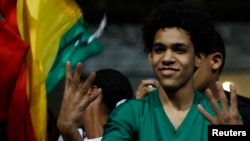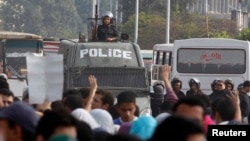CAIRO —
Shortly after Egyptian security forces violently dispersed two sit-ins by supporters of ousted Islamist President Mohamed Morsi in August, killing hundreds, Morsi's supporters began raising the four-fingered 'Rabaa' salute to show solidarity with the victims.
Rabaa means 'fourth' in Arabic, and the symbol was named after the Rabaa al-Adawiya square, where the larger of the two sit-ins took place.
While some say it was Turkish prime minister Tayyip Erdogan, himself the head of a nominally Islamist party, who invented the symbol, its origin is not clear.
The four fingered salute and the iconic black hand on a yellow background have now become ubiquitous at rallies by Morsi's supporters.
Morsi was ousted in July by the military following mass protests against him. After the dispersal of the sit-ins, the government launched a harsh crackdown on the Muslim Brotherhood, Morsi's main backers, killing hundreds more and arresting thousands.
Egyptian kung fu champion Mohamed Youssef has felt the harsh end of the intense debate over the Rabaa symbol and the deep polarization of Egyptian society that has followed Morsi's ouster.
After wearing a T-shirt with the Rabaa symbol on it after winning the gold medal at the World Championship in Russia, Youssef was harshly criticized in the state-backed media and then given a one year ban by the national kung fu federation.
But Youssef says that wearing the T-shirt was not a political statement and that he is not a member of any political group.
Speaking at the gym he trains at in his home city of Alexandria, he says he simply wanted to show solidarity with those who lost their lives.
“First of all, I raised the Rabaa symbol in solidarity with my colleagues who died there, just as thousands of other Egyptians died that day and as an Egyptian I must mourn for the blood that was lost. I must stand in solidarity with my colleagues who died that day because I wish they were here instead with me to share the joy from the championship I won. But unfortunately they died and I had to remember them somehow,” he said.
While supporters of Morsi and even some opponents of the government who are not Morsi supporters, say it is just a symbol of solidarity with the innocent victims of the mass killings in Rabaa and Nahda, their opponents say it is a rallying cry for supporters of militancy.
While rights activists describe the killings in the Rabaa al-Adawiya and Nahda squares as a “massacre”, the interim government contends that there were armed men in the camps which they say were used as detention and torture centers.
The government has said it is waging a “war on terrorism” and has accused the Brotherhood of inciting violence and backing illegitimate groups, including militants in Sinai waging war on the Egyptian military.
Kung fu champion Youssef says that calling the Rabaa symbol a “terrorist” insignia, as some opponents of the Brotherhood, have done, is absurd.
“There are a lot of rumors being said about the Rabaa symbol being a terrorist symbol but of course it isn't. The people that died that day were Egyptian and they died for the sake of Egypt so we cannot call them terrorists nor can we say that this symbol has become anything other than an international symbol of perseverance and determination,” he said.
Youssef is not the only Egyptian athlete to be penalized for showing solidarity with the Rabaa and Nahda victims.
Al-Ahly football striker Ahmed Abdel-Zaher's status with his club is in doubt after he made the four fingered sign during the club's African Cup victory earlier this month.
Rabaa memorabilia has now become something of an industry, with vendors selling everything from T-shirts to rings and key chains at rallies.
Opponents of Morsi, on the other hand, have their share of posters, coffee mugs and even chocolates bearing the picture of the man who ousted him, military chief General Abdel-Fattah al-Sisi.
The success of the Rabaa symbol has led to several imitators, the most noticeable so far being the three fingered salute by those disillusioned with both the military-backed government and the Brotherhood.
Many of the liberal activists who were heavily critical of Morsi now fear a regression in rights under the interim government, and a resurgent interior ministry.
Activist Ronny Habib says the three fingered icon symbolizes opposition to the Brotherhood, the old government of former President Hosni Mubarak and military rule.
“This symbol says down with all traitors: military, remnants of the old regime and Brotherhood. The remnants of the old regime said on January 25, 2011 that these people [the protesters] were funded by America and got free Kentucky Fried Chicken meals. Then the Brotherhood came and hijacked the revolution and they betrayed the revolution and conspired with the military so that Mohamed Morsi could win the elections. The military has always been against the revolution, they have been there for 60 years. Down with everyone that betrayed us, the military, remnants of the old regime and the Brotherhood,” he said during a recent rally to commemorate the killing of protesters in central Cairo's Mohamed Mahmoud street two years ago.
In Egypt's sharply divided political landscape, symbols have taken on enormous importance.
How many fingers you hold up at a protest or even sporting event can earn you applause or scorn depending on the affiliation of your audience.
And the debate over the iconic Rabaa symbol has laid bare the divisions that continue to deepen during Egypt's tumultuous political transition.
Rabaa means 'fourth' in Arabic, and the symbol was named after the Rabaa al-Adawiya square, where the larger of the two sit-ins took place.
While some say it was Turkish prime minister Tayyip Erdogan, himself the head of a nominally Islamist party, who invented the symbol, its origin is not clear.
The four fingered salute and the iconic black hand on a yellow background have now become ubiquitous at rallies by Morsi's supporters.
Morsi was ousted in July by the military following mass protests against him. After the dispersal of the sit-ins, the government launched a harsh crackdown on the Muslim Brotherhood, Morsi's main backers, killing hundreds more and arresting thousands.
Egyptian kung fu champion Mohamed Youssef has felt the harsh end of the intense debate over the Rabaa symbol and the deep polarization of Egyptian society that has followed Morsi's ouster.
After wearing a T-shirt with the Rabaa symbol on it after winning the gold medal at the World Championship in Russia, Youssef was harshly criticized in the state-backed media and then given a one year ban by the national kung fu federation.
But Youssef says that wearing the T-shirt was not a political statement and that he is not a member of any political group.
Speaking at the gym he trains at in his home city of Alexandria, he says he simply wanted to show solidarity with those who lost their lives.
“First of all, I raised the Rabaa symbol in solidarity with my colleagues who died there, just as thousands of other Egyptians died that day and as an Egyptian I must mourn for the blood that was lost. I must stand in solidarity with my colleagues who died that day because I wish they were here instead with me to share the joy from the championship I won. But unfortunately they died and I had to remember them somehow,” he said.
While supporters of Morsi and even some opponents of the government who are not Morsi supporters, say it is just a symbol of solidarity with the innocent victims of the mass killings in Rabaa and Nahda, their opponents say it is a rallying cry for supporters of militancy.
While rights activists describe the killings in the Rabaa al-Adawiya and Nahda squares as a “massacre”, the interim government contends that there were armed men in the camps which they say were used as detention and torture centers.
The government has said it is waging a “war on terrorism” and has accused the Brotherhood of inciting violence and backing illegitimate groups, including militants in Sinai waging war on the Egyptian military.
Kung fu champion Youssef says that calling the Rabaa symbol a “terrorist” insignia, as some opponents of the Brotherhood, have done, is absurd.
“There are a lot of rumors being said about the Rabaa symbol being a terrorist symbol but of course it isn't. The people that died that day were Egyptian and they died for the sake of Egypt so we cannot call them terrorists nor can we say that this symbol has become anything other than an international symbol of perseverance and determination,” he said.
Youssef is not the only Egyptian athlete to be penalized for showing solidarity with the Rabaa and Nahda victims.
Al-Ahly football striker Ahmed Abdel-Zaher's status with his club is in doubt after he made the four fingered sign during the club's African Cup victory earlier this month.
Rabaa memorabilia has now become something of an industry, with vendors selling everything from T-shirts to rings and key chains at rallies.
Opponents of Morsi, on the other hand, have their share of posters, coffee mugs and even chocolates bearing the picture of the man who ousted him, military chief General Abdel-Fattah al-Sisi.
The success of the Rabaa symbol has led to several imitators, the most noticeable so far being the three fingered salute by those disillusioned with both the military-backed government and the Brotherhood.
Many of the liberal activists who were heavily critical of Morsi now fear a regression in rights under the interim government, and a resurgent interior ministry.
Activist Ronny Habib says the three fingered icon symbolizes opposition to the Brotherhood, the old government of former President Hosni Mubarak and military rule.
“This symbol says down with all traitors: military, remnants of the old regime and Brotherhood. The remnants of the old regime said on January 25, 2011 that these people [the protesters] were funded by America and got free Kentucky Fried Chicken meals. Then the Brotherhood came and hijacked the revolution and they betrayed the revolution and conspired with the military so that Mohamed Morsi could win the elections. The military has always been against the revolution, they have been there for 60 years. Down with everyone that betrayed us, the military, remnants of the old regime and the Brotherhood,” he said during a recent rally to commemorate the killing of protesters in central Cairo's Mohamed Mahmoud street two years ago.
In Egypt's sharply divided political landscape, symbols have taken on enormous importance.
How many fingers you hold up at a protest or even sporting event can earn you applause or scorn depending on the affiliation of your audience.
And the debate over the iconic Rabaa symbol has laid bare the divisions that continue to deepen during Egypt's tumultuous political transition.












